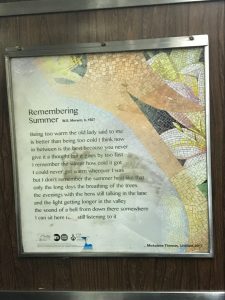Margaret Atwood was born on November 18, 1939 in Ottawa, Canada. She is currently 79 years old. In her early life, she did not go to school full time because her father was an entomologist so “she [spent] most of her childhood in the backwoods of Quebec.” Despite this, she had great interest in writing, even as a young child. At the age of 16, after going to school full-time from 8th grade, she decided to pursue her writing career. In 1962, her book “Double Persephone” was published and the book won the E.J.Pratt award. Another famous work of hers is “The Handmaid’s Tale.” It has a movie and TV adaptation and is very popular. Then, in 1962, she got her master’s degree from Harvard Radcliffe College. One of Margaret’s most famous book is “The Circle Game,” which was published in 1964. After this, she started to write all kinds of books, like novels, short stories, screenplays, and etc. A lot of Margaret’s books would revolve around a woman since Margaret is a feminist, for example, “The Edible Women” and ”Surfacing.” In 1968, she married her later ex-husband Jim Polk and they would later divorce in 1973. Then, she married her present husband, Graeme Gibson, and they had a daughter together. Some of her poems include “Morning in the the Burned House” and “Power Politics.” She also wrote novels, such as “ Cat’s Eye” and “Surfacing”. Essays that Margaret wrote include “Moving Targets: Writing with Intent” and “Curious Pursuits:Occasional Writing.” Margaret’s works have won her many awards.
Work Cited
- “Who Is Margaret Atwood? Everything You Need to Know.” Childhood, Life Achievements & Timeline, www.thefamouspeople.com/profiles/margaret-eleanor-atwood-2238.php.
- Poetry Foundation. (2018). Margaret Atwood. [online] Available at: https://www.poetryfoundation.org/poets/margaret-atwood [Accessed 27 Nov. 2018].




